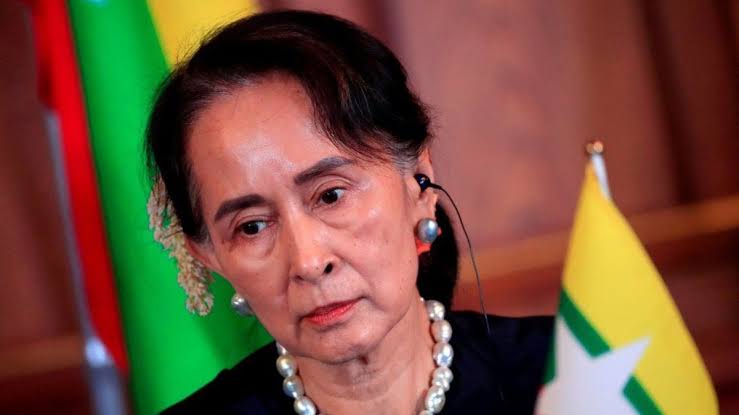President Win Myint was also sentenced to four years as the court delivered its first verdicts in numerous cases against Aung San Suu Kyi and other civilian leaders deposed by the military in a coup on February 1. Win Myint’s sentence was also later halved to two years.
According to the report on MRTV, the sentences would be applied “at their current detention places,” apparently meaning they would not be sent to prison. It is not clear where Aung San Suu Kyi has been held but she has not described it as a prison.
Zaw Min Tun, a spokesman for Myanmar’s military told the AFP news agency that Aung San Suu Kyi was found guilty of incitement and of violating COVID-19 rules.
The ruling was the first in a dozen cases the military has brought against the 76-year-old since it deposed her civilian government. The trial in Naypyidaw has been closed to the media, while the military has barred Aung San Suu Kyi’s lawyers from communicating with the media and the public.
Other cases against the Nobel Peace Prize laureate included multiple charges of corruption, violations of a state secrets act, and a telecoms law that altogether carry a maximum sentence of more than 100 years in prison.
Her supporters have said the cases are baseless and designed to end her political career and tie her up in legal proceedings while the military consolidates power.
Aung San Suu Kyi has denied all the charges.
The UN human rights investigator on Myanmar urged countries on Monday to increase economic pressure on Myanmar’s generals after the sentences were announced.
“Today’s sentencing demonstrates why the international community must take stronger action to support the people of Myanmar by denying the junta the revenue and weapons that they need to continue their illegitimate grip on the people of Myanmar,” Thomas Andrews, a former US congressman who is serving in the independent post, said in a statement.
“I call upon member states to significantly increase pressure on the junta as a result of this outrageous action.”
The daughter of the hero of Myanmar’s independence from British colonial rule, Aung San Suu Kyi spent years under house arrest under a previous military government.
She was freed in 2010 and led her National League for Democracy (NLD) to a landslide victory in a 2015 election.
Her party won again in November last year but the military said the vote was rigged and seized power weeks later. The election commission at the time dismissed the military’s complaint of vote fraud.
Historian and author Thant Myint-U said the military leaders thought their predecessors who launched reforms more than 20 years ago had gone too far in allowing Aung San Suu Kyi back into politics and the entire reason for the coup was to exclude her.
“She remains far and away most popular in Myanmar politics and may still be a potent force in what’s to come,” he told the Reuters news agency.
Western states have demanded Aung San Suu Kyi’s release and condemned the violence since the coup.
On Monday, the United Kingdom said the former leader’s sentencing was “another appalling attempt by Myanmar’s military regime to stifle opposition and suppress freedom and democracy” and called on the “regime to release political prisoners, engage in dialogue and allow a return to democracy”.
Matthew Smith, the chief executive of the Fortify Rights group, said the sentencing was “part of a widespread and systematic attack on the civilian population” and called for the immediate release of Aung San Suu Kyi and other political prisoners.



